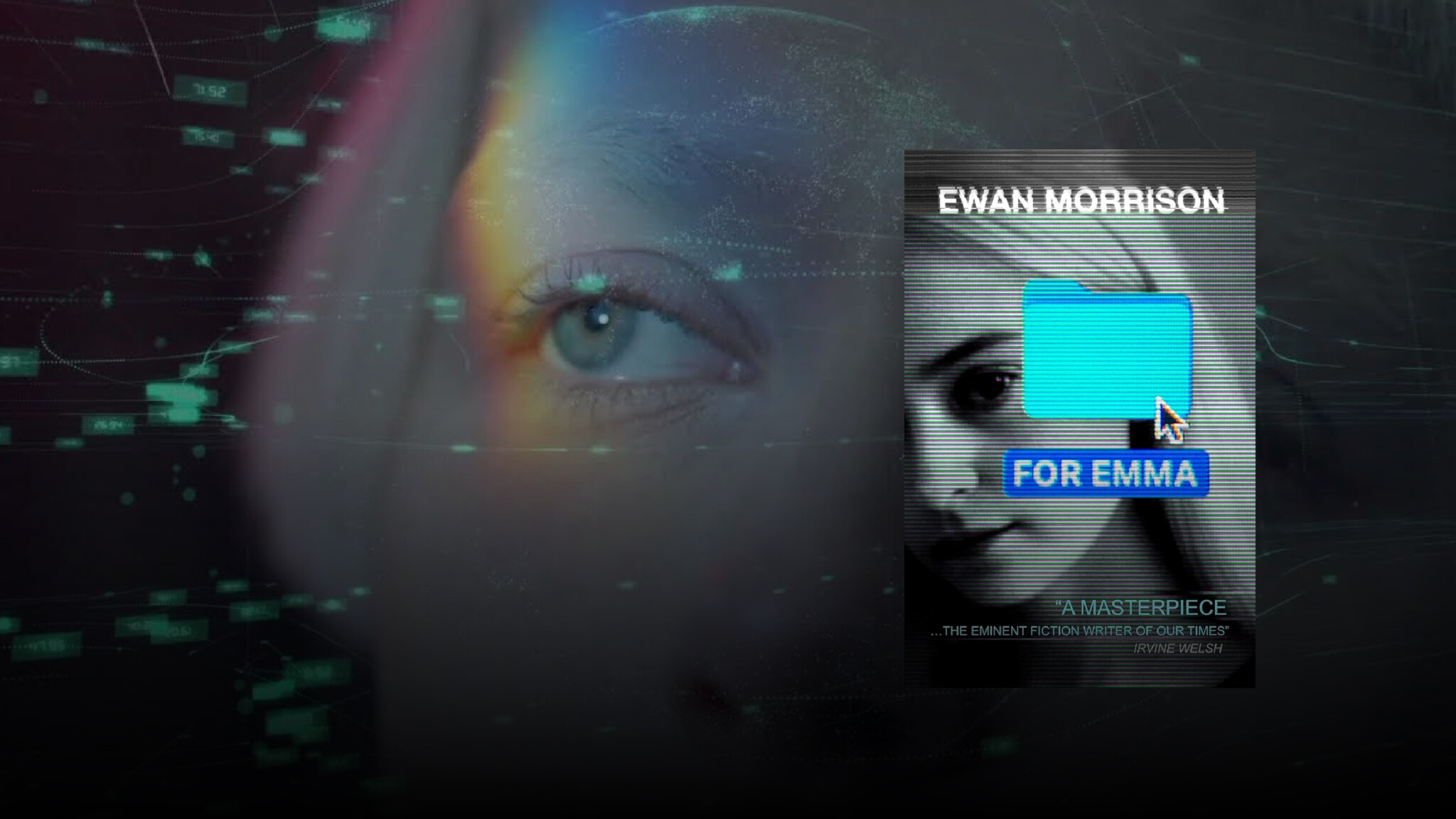
Scottish novelist Ewan Morrison’s FOR EMMA explores love, loss, and digital memory in a haunting new take on identity and obsession.
How worried should we be about new technology? The car and the aeroplane loomed at one time over humanity like great, improbable, alien inventions — and even the humble escalator required smelling salts on first launch. The plane and the car, in particular, became objects of fascination for artistic movements, particularly Futurism and other avant-gardes. What would a literature or an artform capable of meeting and adequately reflecting new technology look like?
Filippo Tommaso Marinetti, author of the 1909 Futurist Manifesto wrote “A racing automobile with its bonnet adorned with great tubes like serpents with explosive breath … a roaring motor car which seems to run on machine-gun fire, is more beautiful than the Victory of Samothrace.” Yet for every encomium penned to new machines, there is another literary tendency, filled with dire warnings, prophesying a world turned dark at the hands of tools that have rendered us captives and slaves.
With FOR EMMA, Ewan Morrison follows in a great lineage of those who can take a strand of the present, a promise, and draw out the logical — and perhaps devastating — conclusions of a particular trajectory. Morrison’s technogothic novel also pays homage to the great romantic tendency of novels such as Mary Shelley’s 1818 Frankenstein (whose subtitle “Or, The Modern Prometheus” alerts us to the terrible and tragic nature of human hubris), but also to more recent attempts to understand our mediated, screen-based, virtual age, in the work of William Gibson in particular, whose “cyberpunk” novels Neuromancer (1984) and Pattern Recognition (2003), among others, explore a world where memory and intelligence are stripped from their human bearers.
Enjoy independent, ad-free journalism - delivered to your inbox each week
FOR EMMA — whose antihero protagonist Josh Cartwright seeks to avenge his daughter’s complex destruction at the hands of “Biosys”, a shady tech company which nevertheless possesses immense power over the internet, and is carrying out all manner of dangerous, harrowing, and deadly experiments on human subjects — carries such a warning. FOR EMMA taps into a whole host of contemporary realities and fears: above all, the fear that new technologies — Artificial Intelligence and more invasive technology, such as implants, will irreparably transform what it means to be human.
Morrison makes it clear that these technologies will appear promising liberation, salvation, freedom from pain, and convenience. If one clicks on the project page for Elon Musk’s “Neuralink”, the site currently reads “Neuralink is currently seeking people with quadriplegia to participate in a groundbreaking investigational medical device clinical trial for our brain-computer interface”. Who could object to this? As one character in FOR EMMA puts it: “Again and again, these Bio Tech corporations justify their calls for greater investment by claiming that the future inventions will greatly improve the quality of life for disabled people — while they always say they are still in the early days of these emerging experimental technologies.”
After his daughter Emma, a highly intelligent woman with a penchant for asking “why?” signs up for a Biosys trial, on the basis that it might help her poor old dad who suffers from depression, things take a tragic and murky turn and Cartwright plans his great act against the company, recording his progress in a series of video diary entries counting down to his planned suicide-murder of Biosys CEO Zach Neumann. These videos end up in the hands of a non-fiction editor, who serves as our increasingly anxious narrator, as she too comes under increasing and mysterious threat from an amalgam of state and tech interests. FOR EMMA does a good job of leaving open the ultimate location and identity of power, but taps into all kinds of contemporary fears around false flag operations, MK ULTRA, the fusion of government and tech companies, and the increasing feeling that technology is altogether much, much closer and more invasive than we would like, assuming we would ever be able to discover just how proximate it actually is. Morrison too acutely depicts the way in which anyone who questions the status quo is liable to be depicted as “far-right” by the media and state (remember, among many other examples, Keir Starmer’s use of this phrase in the face of anger at the murder of three schoolgirls by Axel Rudakubana in July 2024).
FOR EMMA does a good job of leaving open the ultimate location and identity of power, but taps into all kinds of contemporary fears around false flag operations, MK ULTRA, the fusion of government and tech companies, and the increasing feeling that technology is altogether much, much closer and more invasive than we would like, assuming we would ever be able to discover just how proximate it actually is.
There are shades of the Unabomber, Ted Kaczynski, in Cartwright. As he becomes increasingly addled by booze, drugs, and the various injuries he sustains along his explosive-making way, he falls deeper and deeper into an anti-tech, all-too-human delirium, though the extent to which he is in control of his actions becomes less and less obvious. He hears voices — he thinks it’s his dead daughter coming to chastise or to guide him, but what if her memory too has been hacked?
While Morrison’s protagonist meanders between self-pity, regret, and sentimentality, some of his reflections on his failure as a father indict the entire liberal order. In a remembered conversation with Emma’s mother, who he is divorced from after an online affair, Cartwright reflects:
“Maybe the problem is us! Maybe if we actually had an answer to Em’s questions, she’d stop asking why-why-why. But we don’t. I mean as parents. Think about it, a hundred years ago, a kid would ask their parents why we’re alive and the parents would reply, because God made us, and if we behave we’ll go to Heaven and live for eternity. But we don’t have any answer, so she studies science day and night.”
Science-as-religion, as a cult without answers, but with all kinds of dangerous promises and opportunities for technocratic anti-human policies, as greatly in evidence during the recent lockdowns, is undoubtedly the bastard ideology of our age. We are very definitely in great danger of simply accepting “scientific progress” as inevitable, even desirable. Visiting Biosys HQ, Cartwright notes: “The kids have apps that monitor their footsteps, their calories, heart rate, medical histories, their taste in music, their use of safe and inclusive words. The AI pre-selects who they will date and who they’ll vote for.” This is already, of course, our world. What difference would it really make if people were chipped, rather than having a phone?
Visiting Biosys HQ, Cartwright notes: “The kids have apps that monitor their footsteps, their calories, heart rate, medical histories, their taste in music, their use of safe and inclusive words. The AI pre-selects who they will date and who they’ll vote for.” This is already, of course, our world. What difference would it really make if people were chipped, rather than having a phone?
A de facto social credit system already operates, insofar as people with the wrong views are debanked, banned, and socially shunned. It’s easy for a fusion of government and big tech to imagine that the solution to the complexity of contemporary life will be to simply imagine the human as machine, as node. The quest to replace God by the machine (here called “Infinity”) will eliminate any understanding of humanity as ensouled creatures. The recent rise in young people in particular returning to church should encourage us, however, to note that many people feel a deep sense of unease in the face of a purely material and techno-scientific universe.
Morrison’s Cartwright cuts a tragic figure against the shiny backdrop of a smooth machinic future, all grief and regret, and all the more savage for that. FOR EMMA is a howl of alarm in the face of techno-optimism and a reminder too that our great literary writers ought not to be replaced by machines: for what machine would ultimately be willing to draw attention to its own destructive powers? We need writers like Morrison to think through the present in order to better understand the near future — literature shakes us from our acquiescence and reminds us that horror is all too proximate to hubris.




Comments (0)
Only supporting or founding members can comment on our articles.